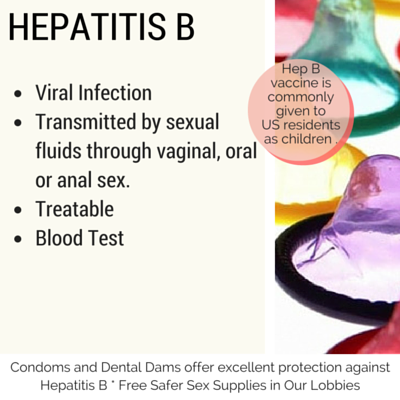Hepatitis B

Hepatitis B
Hepatitis B is a sexually transmitted infection (STI) that affects all genders. It is a viral infection, that is treatable, not cureable. It spreads through sexual fluids via oral, vaginal or anal sex.
There are 5 strains of Hepatitis: A, B, C, D and E.
B, C and D are transmitted through blood. B may also be transmitted through sexual fluids. A and E are transmitted through contaminated water or fecal matter.
Symptoms
Hepatitis may be short-lived(acute) or long-lived (chronic.) Many people have acute Hepatitis B.
Signs and symptoms of hepatitis B, ranging from mild to severe, usually appear about one to four months after you've been infected. Signs and symptoms of hepatitis B may include:
- Abdominal pain
- Dark urine
- Fever
- Joint pain
- Loss of appetite
- Nausea and vomiting
- Weakness and fatigue
- Yellowing of your skin and the whites of your eyes (jaundice)
What Are The Health Problems Associated With Hepatitis B?
- Hepatitis affects the liver.
- Acute hepatitis B infection lasts less than six months. Your immune system likely can clear acute hepatitis B from your body, and you should recover completely within a few months. Most people who acquire hepatitis B as adults have an acute infection, but it can lead to chronic infection.
- Chronic hepatitis B infection lasts six months or longer. When your immune system can't fight off the acute infection, hepatitis B infection may last a lifetime, possibly leading to serious illnesses such as cirrhosis and liver cancer.
- The younger you are when you get hepatitis B — particularly newborns or children younger than 5 — the higher your risk the infection becoming chronic. Chronic infection may go undetected for decades until a person becomes seriously ill from liver disease.
Women's Health Specialist is not currently testing for Hepatitis B
Please reach out to your primary care if you need to be tested.
Treatment
If you are diagnosed as having Hepatitis B, your sexual partners(s) should be treated as well. You are at risk to be re-infected without treating sexual partners or using condoms.
Keeping your immune system healthy is a good way to prevent Hepatitis B from becoming long-lasting.
There are vaccines for infants, children and adults available that we will refer you to.
Test Your Knowledge
1. True or False: A person of any gender can give Hepatitis B to a person of any gender.
2. True or False: Condoms are a HIGHLY effective way to prevent the transmission of Hepatitis B.
3. True or False: A mother can pass it to her infant.
4. True or False: If you're have anal, vaginal or oral sex, the only way to know if you've been exposed is to get tested.
5. True or False: Most people will have a sexually transmitted infection during the course of their lifetime.
All True!